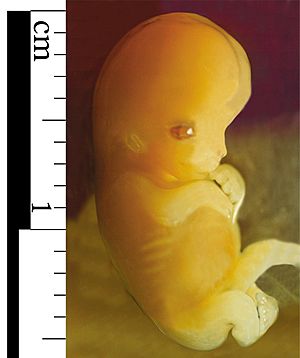Gestation facts for kids
Gestation is the special time when some animals carry their babies inside their bodies before they are born. Think of it like a baby growing safely inside its mother. Animals that do this are called viviparous animals. This means the baby develops inside the mother's body until it is ready to be born alive.
Many animals can have more than one baby growing inside them at the same time. This is how almost all mammals have their young. The only exceptions are monotremes, like the platypus, which lay eggs.
The total time from when a baby starts to form (when an egg is fertilized) until it is born is called the gestation period.
For Humans, this amazing journey usually lasts about 37 weeks. That's around 9 months and 1 week. But gestation times can be very different for other animals! For example, a Syrian hamster has one of the shortest gestation periods, lasting only about 16 days.
Contents
What is Gestation?
Gestation is the process where a baby animal grows inside its mother. It's a period of development that happens before birth. During this time, the baby gets all its food and protection from its mother.
This process is how many different kinds of animals bring new life into the world. It ensures the baby is safe and nourished as it develops.
The Gestation Period: How Long Does It Last?
The length of the gestation period varies a lot between different animal species. It depends on how quickly the baby animal develops.
- Shortest Periods: Some small animals, like the Syrian hamster, have very quick gestation periods. Their babies are ready to be born in just over two weeks.
- Longest Periods: On the other hand, larger animals often have much longer gestation periods. For example, an African elephant carries its baby for nearly two years! That's about 660 days.
Here are a few examples of gestation periods for different animals:
- Mouse: 19-21 days
- Cat: 63-65 days
- Dog: 58-68 days
- Pig: 112-115 days
- Human: 266-280 days (about 9 months)
- Horse: 330-340 days
- Whale: 365-547 days (12-18 months, depending on species)
- Elephant: 600-660 days (about 22 months)
How Babies Develop During Gestation
During gestation, the tiny new life goes through several stages of development.
- Embryo: In the early stages, the developing baby is called an embryo. This is when its main body parts and organs start to form.
- Fetus: After the embryo stage, it becomes a fetus. At this point, most of its body parts are formed, and it mostly grows bigger and stronger.
The mother's body provides everything the baby needs. This includes nutrients and oxygen, which are delivered through a special connection called the placenta. The placenta also helps remove waste from the baby.
Why is Gestation Important?
Gestation is a very important process for the survival of many animal species.
- Protection: The baby is protected inside the mother's body from dangers outside.
- Nourishment: It receives constant food and oxygen for healthy growth.
- Development: It allows the baby to develop fully before being born. This gives it a better chance to survive and thrive in the outside world.
Images for kids
See also
 In Spanish: Gestación para niños
In Spanish: Gestación para niños
 | Janet Taylor Pickett |
 | Synthia Saint James |
 | Howardena Pindell |
 | Faith Ringgold |





